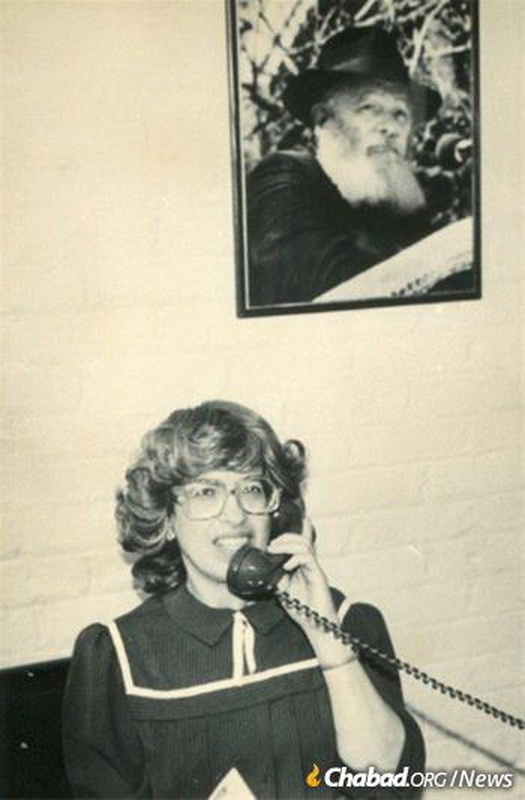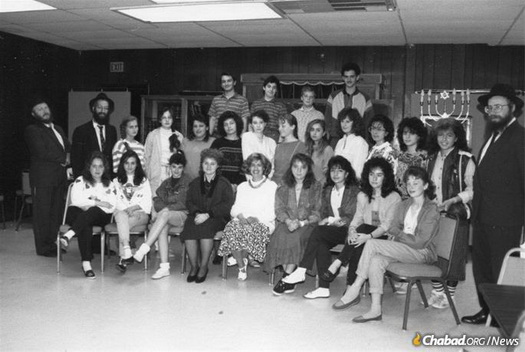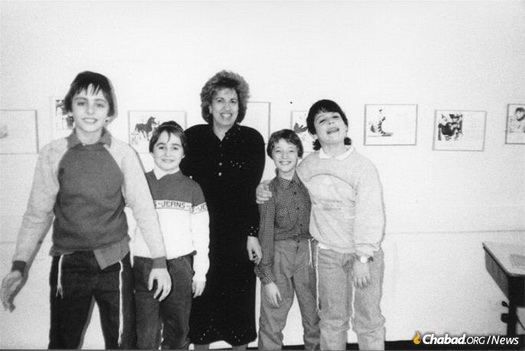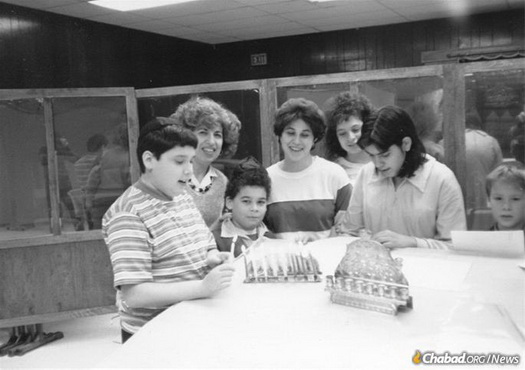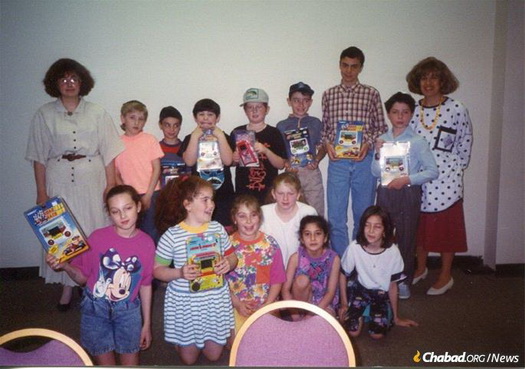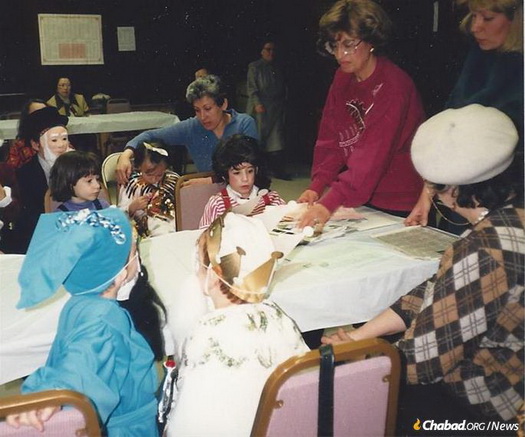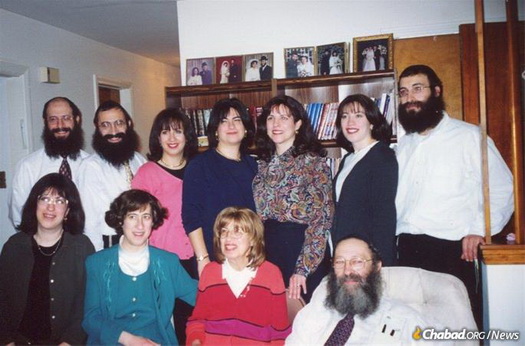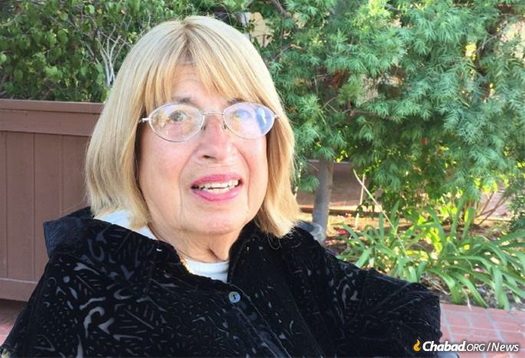
Obituary: Reitza Kosofsky, 88, Founded an Empire of Kindness in Chicago
by Menachem Posner – chabad.org
Standing in the kitchen of her modest Chicago ranch home, Reitza Kosofsky would spend hours with the phone on one shoulder and a baby on the other, wrangling for government grants, sending packages for families in need, sharing words of encouragement in a medley of languages and doing everything in her power to smooth out the adjustment of newly arrived immigrants from the Soviet Union.
Kosofsky, who passed away on Tuesday at the age of 88, was the longtime president of F.R.E.E. (Friends of Refugees of Eastern Europe) of Chicago and an indefatigable pioneer of outreach in the Russian-Jewish community since 1973. From its humble beginnings in the Kosofsky home, F.R.E.E has since grown into a major landmark on the city’s Jewish landscape.
Born in Chicago in 1932 to Ben and Jennie Kushner, she was deeply interested in broadening her Jewish education and involvement, convincing her parents to sign her up for the Hebrew parochial school, a novelty in those days, even among the Orthodox.
In 1951, she married Yitzchok (Irwin) Kosofsky, a CPA, who was part of a small core of young people in post-war Chicago who were deeply committed to maintaining traditional Judaism.
Through the leading Chabad Chassidim in Chicago, notably Rabbi Shlomo Zalman and Chaya Sarah Hecht, and Rabbi Herschel and Chava Schusterman, the Kosofskys developed a connection with the Rebbe—Rabbi Menachem M. Schneerson, of righteous memory—and became devoted heart and soul to the ideals of Chabad-Lubavitch.
The mother of a growing brood (the Kosofskys went on to have nine children), Kosofsky joined the local chapter of N’shei Chabad and took an active role in arranging programs and classes for women.
Welcoming Refugees From Eastern Europe
In the early 1970s, heeding the Rebbe’s call to help those trickling out of the Soviet Union with their material and spiritual needs, the Chicago N’shei arranged a welcoming gathering for five families who had just arrived from Minsk (now Belarus), where they presented the immigrant women with candlesticks, which they encouraged them to light each week before the start of Shabbat on Friday nights.
The gathering was conducted in Yiddish, which everyone present spoke and understood to varying degrees.
The Rebbe received a report from the event and encouraged the women to create a new organization to cater to the immigrants.
Kosofsky, at the time a stay-at-home mother whose eldest daughter had just gotten married and whose youngest at the time (her seventh) was still a baby, became the leader of the new organization, F.R.E.E. (Friends of Refugees of Eastern Europe) of Chicago.
As the trickle of immigrants swelled into a tidal wave, F.R.E.E. also grew and expanded.
They began by arranging Hanukkah parties, Passover Seders and other holiday events, as well as classes on the basics of Judaism, for Soviet-born Jews, most of whom had been forcibly deprived of a Jewish education.
The first Hanukkah party was held in a private home; the second was held in a hall. The first Passover seder was attended by 175 people; the second attracted 300, and the number soon rose to 400 annually.
As programming expanded, Kosofsky and the women of N’shei Chabad marshaled the assistance of community organizations such as Maot Chitim of Chicago, the JUF (Jewish United Fund) and the ATT (Associated Talmud Torah), as well as an army of volunteers, who gave generously of their time and contacts to assist in many ways.
Synagogues in declining neighborhoods donated classroom space for a Hebrew school and eventually a day school, and a government grant facilitated employment training for the immigrants, who were often highly skilled but lacked language skills.
Following a directive from the Rebbe’s office, a major effort was focused on recruiting immigrant children to the local Jewish day schools. After the schools protested that they could not accommodate more Russian children, Kosofsky founded a day school of her own, which lasted for 20 years.
Often helping people find appropriate employment took ingenuity and a keen interest in people’s prior lives. For example, one individual had been a professional chauffeur in Moscow, who had been sentenced to seven years of prison for giving Golda Meir, Israel’s ambassador to the Soviet Union, an unsanctioned tour of Moscow. In Chicago, Kosofsky arranged for him to drive immigrant children to and from Jewish schools each day. Another major focus for Kosofsky and her team was arranging circumcisions for the newly arriving males, including many adult men, an effort that is still going strong. The effort required the cooperation of trained mohalim, medical doctors, local hospitals and the JUF.
Keen Interest From the Rebbe
The Rebbe took a keen interest in their work. In an interview with JEM’s “My Encounter with the Rebbe” project, Yitzchok Kosofsky recalled receiving an urgent call from the Rebbe’s office on erev Yom Kippur (perhaps the busiest day on the Jewish calendar) with a message from the Rebbe: If a Jew was willing to undergo circumcision, they were to provide the procedure as soon as possible.
Throughout the 1970s, Kosofsky would arrange for Russian-born yeshivah students and couples to come to Chicago for weeks or months at a time to assist in her work. Many of them left their mark on the landscape of Russian Jewish Chicago.
Rabbi Betzalel and Mira Schiff lived in Chicago for a year and greatly expanded F.R.E.E.’s reach. Betzalel became editor of the Russian-language newspaper Shalom, which is still in print, organized concerts and holiday celebrations, started a Russian-language radio program and helped fundraise.
Other programs included a Russian-language lending library, tutoring for children and adults, a day camp, bar mitzvah and bat mitzvah preparation, and Jewish weddings for couples who had been deprived of the ceremony, including one mega celebration for 36 couples in one giant hall.
By 1980, it became clear that more help was needed, so Russian-born Rabbi Shmuel and Shternie Notik came to Chicago to head up F.R.E.E.’s activities.
Under their leadership, F.R.E.E. continued to blossom and welcome successive waves of Russian immigrants, especially those who poured in in the late 1980s and early ’90s.
‘She Was a Wonderful Listener’
As the Russian-American Jewish community established itself financially and socially F.R.E.E.’s programs evolved as well. The early immigrants needed used sweaters, mattresses and food packages. But 10 or 20 years later, they were often financially stable but desperately seeking social and religious connections.
To address their needs, a second branch of F.R.E.E. was founded in the middle-class suburb of Niles in 1988, directed by Rabbi and Mrs. Naftoli Hershkovich (Katz).
As the upwardly mobile Russian Jews continued to move further afield, a third location was opened in the tony suburb of Riverwoods in 2003. Then, reflecting the return to urban centers, a fourth location was added in the Uptown neighborhood in 2017.
Deep into her retirement age, she continued her involvement with the organization and other communal activities.
Alongside her husband, she provided support and assistance to the growing cadre of Chabad-Lubavitch emissaries in the Chicago area, led by local-born Rabbi Daniel Moscowitz.
Even though she had her hands full with organizational responsibilities, Kosofsky remained available and attentive to the needs of individuals, especially those unspoken.
With kindness and warmth, she would counsel and comfort many in the cozy warmth of her kitchen.
“She was a warm, welcoming and non-judgmental grandmother figure to me,” recalls Batsheva Reznik, who was born in Moldova and had come to Chicago from Houston to attend high school. “She was a wonderful listener to whom you could pour out your heart knowing that there would be no judgment, only concern. She saw everyone for what they truly were: a neshamah, a precious Jewish soul.”
Reznik fondly recalls how Kosofsky made sure that she had a coat warm enough for the Chicago winter and made it a point to give her some money before Hanukkah since her family in faraway Texas would probably not be able to give her Hanukkah geltin person.
“She was not young when I knew her, but she had this strength and determination that just rubbed off on you,” continued Reznik. “If something needed to happen, she would just make it happen, quietly and without a fuss.”
Once, on the street, she came across a recent immigrant who was pregnant and without financial support, and considering aborting the baby. Sensing that something was wrong, she brought her into the F.R.E.E. office and convinced her to have the baby. That baby grew up and raised a Jewish family.
The Kosofskys maintained a warm and open home. Many rabbis and tzedakah collectors who came to Chicago found lodgings and a warm meal at the Kosofsky residence, along with high schoolers like Reznik and others, who knew they had an open door where they could “hang out” and work on projects.
In the early 1970s, when the Rebbe’s farbrengens began to be broadcast over the phone lines, the Kosofskys offered their home for the hook-up and experimented with different ways to attach wires from the old-fashioned phone box to a reel-to-reel tape recorder borrowed from Jacob (Yankel) Katz, a local philanthropist and Chassid.
Together with her husband, she watched with pride as their children took up positions as shluchim in Australia, Argentina and across the United States.
Predeceased by her husband last spring, she leaves behind their children: Nechama Prus (Newton, Mass.); Mina Gordon (Melbourne, Australia); Rabbi Noach Kosofsky (Longmeadow, Mass.); Rabbi Chaim Kosofsky (Longmeadow, Mass.); Chany Mochkin (Rochester, N.Y.); Baila Chein (Buenos Aires); Rabbi Lipman Kosofsky (Brooklyn, N.Y.); Sori Levitansky (S. Monica, Calif.); Devori Baumgarten (Rockaway, N.J.); as well as hundreds of grandchildren and great-grandchildren.
She leaves behind a brother Irwin Kushner, of Highland Park, Ill.; and a sister, Chaya Faier of Jerusalem.
She was predeceased by great-grandchildren, Miriam Baila Goldszweig and Yehoshua Binyamin Cyrulnik.
This article has been reprinted with permission from chabad.org
